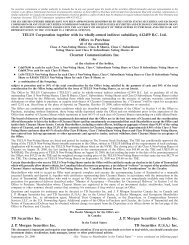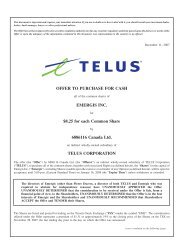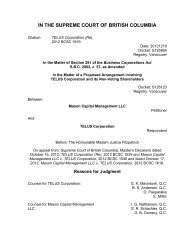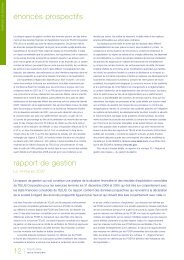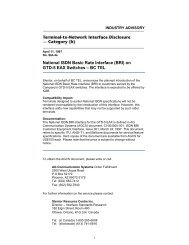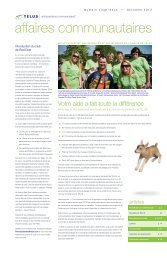Shareholder Letter, September 29, 2012.pdf - About TELUS
Shareholder Letter, September 29, 2012.pdf - About TELUS
Shareholder Letter, September 29, 2012.pdf - About TELUS
You also want an ePaper? Increase the reach of your titles
YUMPU automatically turns print PDFs into web optimized ePapers that Google loves.
– 2 –<br />
Our previous proposal had the overwhelming support of our shareholders – excluding Mason, 92.4 per cent of total shares<br />
received were in favour of the proposal. It also received the endorsement of the two leading independent proxy advisory<br />
firms that institutional investors rely on for advice: ISS and Glass Lewis. However, it was clear that given Mason’s actions<br />
and its large voting position (despite having a minor economic investment in <strong>TELUS</strong>), our proposal would not have passed<br />
if it had gone to a vote in May. This is because only 67 per cent of common shareholders cast votes, which makes it so<br />
important that as many as possible vote FOR our proposal to overcome Mason’s large position.<br />
When we withdrew our previous proposal, we committed to reintroducing a similar proposal in due course on the same<br />
one-for-one ratio so as to preserve its value-enhancing shareholder benefits. This was our promise to you – a promise we<br />
fulfilled when we introduced our share exchange proposal on August 21.<br />
Mason is once again actively seeking to defeat our proposal because, if the proposal is defeated, and the trading price of<br />
the non-voting shares decreases more than the trading price of the common shares, Mason would then profit from the<br />
increased difference between the two share prices.<br />
In other words, Mason does not realize a profit by promoting long-term share value appreciation. This is in stark<br />
contrast to shareholders like you whose interest is in seeing <strong>TELUS</strong> shares appreciate in value.<br />
Independent third-party corporate governance advisor ISS said, “If announcement of the transaction itself increased the<br />
company’s market value higher, voting down the transaction should logically result in the loss of some or all of that<br />
incremental market value.”<br />
Supreme Court of B.C. and highly respected U.S. law firm strongly criticize Mason’s empty voting tactics<br />
As the Supreme Court of British Columbia recently observed in connection with Mason’s efforts to disrupt our share<br />
exchange proposal, “only Mason stands to profit” if the price spread between common shares and non-voting shares<br />
increases and “only Mason is indifferent to the overall value of <strong>TELUS</strong> itself.” Indeed, the highly respected New Yorkbased<br />
law firm Wachtell, Lipton, Rosen & Katz – ranked the Most Prestigious Law Firm to Work For in the USA by the<br />
Avery Index – stated its support for the court’s decision, saying Mason’s empty voting tactics are “deeply pernicious”<br />
and asking the U.S. Securities and Exchange Commission “to undertake comprehensive regulatory reform to address the<br />
ongoing abuse” of investment arrangements by parties like Mason.<br />
Our proposal, which was thoroughly and objectively analyzed, is fair to holders of each class of shares<br />
In an effort to ensure our proposal would be in <strong>TELUS</strong>’ best interests and would be fair to the holders of common shares<br />
and non-voting shares, respectively, <strong>TELUS</strong>’ Board of Directors put in place a process that was consistent with the best<br />
standards of corporate governance. The Board’s process included, among others, the following steps:<br />
• Formation of a Special Committee of the Board composed of independent directors to consider the proposal.<br />
• Direction to this Committee to follow a thorough process consistent with the highest governance standards.<br />
• Obtaining extensive expert financial and legal advice to assist in the decision-making process.<br />
• Obtaining a fairness opinion from independent financial advisors, Scotia Capital, that stated, in their view, the oneto-one<br />
exchange ratio is fair from a financial point of view to holders of shares of each class, respectively.<br />
• Structuring the transaction such that the proposal requires the approval of all shareholders – a simple majority of<br />
the common shares and at least two-thirds of the non-voting shares voted at the meetings – and court approval.<br />
• It is important to note that since our share exchange proposal only affects the legal rights of non-voting<br />
shareholders (and does not affect the legal rights of common shareholders) and does not involve amendments to<br />
our Articles, approval of the common shareholders is not legally required. However, given <strong>TELUS</strong> desires to act<br />
consistent with good governance practices, we decided to provide for common shareholder approval at 50 per cent<br />
plus one vote and, in this fashion, ensure that both classes of shareholders are consulted. ISS supports this<br />
approach, saying, “an affirmative vote from a majority of shareholders is usually considered sufficient evidence of a<br />
clear shareholder mandate.”<br />
Your vote is extremely important. Please vote your yellow proxy or voting instruction form today.<br />
If you have any questions or need any assistance, please call Laurel Hill Advisory Group toll-free in North America at<br />
1-877-304-0211 or by email at assistance@laurelhill.com.



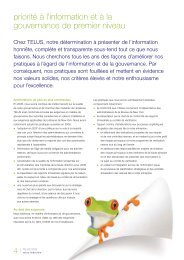
![DISK004:[98CLG6.98CLG3726]BA3726A.;28 - About TELUS](https://img.yumpu.com/16786670/1/190x245/disk00498clg698clg3726ba3726a28-about-telus.jpg?quality=85)
